- Home
- John Irving
Last Night in Twisted River Page 6
Last Night in Twisted River Read online
Page 6
Children know when they are not loved unconditionally. Dominic was aware that his mother had felt she was spurned. And while Rosie never appeared to resent the circumstances that had compelled her to marry a mere boy, she truly resented how her family had banished her to Berlin in the first place.
The entreaties by the Saetta and Calogero families fell on deaf ears. Who were they to say all was forgiven? Apparently, it was okay with them that the cousins were married, and that they had a child; but what Dominic and Rosie remembered was how it had not been okay for either a Saetta or a Calogero to be pregnant and unmarried.
"Let them find someone else to forgive," was how Rosie put it. Dominic, knowing how Nunzi had felt, agreed. Boston was a bridge that had been burned behind them; more to the point, the young couple felt confident that they hadn't burned it.
Surely moral condemnation wasn't new to New England, not in 1942; and while most people might have chosen Boston over Twisted River, the decisions made by many young married couples are circumstantial. To the newly formed Baciagalupo family, Twisted River may have seemed remote and raw-looking, but there was no paper mill. The sawmill and logging-camp settlement had never kept a cook through a single mud season, and there was no school--not in a town largely inhabited by itinerants. There was, however, the potential for a school in the smaller but more permanent-seeming settlement on Phillips Brook--namely, Paris (formerly, West Dummer), which was only a few miles on the log-hauler road from the visibly scruffier settlement in Twisted River, where the logging company had heretofore refused to invest in a permanent cookhouse. According to the company, the portable, makeshift kitchen and the dining wanigans would have to do. That this made Twisted River look more like a logging camp than an actual town failed to discourage Dominic and Rosie Baciagalupo, to whom Twisted River beckoned as an opportunity--albeit a rough one.
In the summer of '42--leaving themselves enough time to order textbooks and other supplies, in preparation for the new Paris school--the cook and the schoolteacher, together with their infant son, followed the Androscoggin north to Milan, and then traveled north-northwest on the haul road from the Pontook Reservoir. Where Twisted River poured into the Pontook was simply called "the narrows;" there wasn't even a sawmill, and the rudimentary Dead Woman Dam was as yet unnamed. (As Ketchum would say: "Things were a lot less fancy then.")
The couple with their child arrived at the basin below Twisted River before nightfall and the mosquitoes. To those few who remembered the young family's arrival, the man with the limp and his pretty but older-looking wife with her new baby must have appeared hopeful--although they carried only a few clothes with them. Their books and the rest of their clothes, together with the cook's kitchenware, had come ahead of them--all of it on an empty logging truck, covered with a tarp.
The kitchen and dining wanigans needed more than a good cleaning: A full-scale restoration was what the wanigans wanted--and what the cook would insist on having, if he was going to stay. And if the logging company expected the cook to remain past the next mud season, they would have to build a permanent cookhouse--with bedrooms above the cookhouse, where the cook and his family intended to live.
Rosie was more modest in her demands: A one-room school would be sufficient for Paris, nee West Dummer, where there had never been a school before; there were only a few families with school-age children on Phillips Brook in 1942, and fewer still in Twisted River. There would soon be more--after the war, when the men came home--but Rosie Baciagalupo, nee Calogero, wouldn't get to see the men return from war, nor would she ever educate their children.
The young schoolteacher died in the late winter of 1944--shortly after her son, Dan, had turned two. The boy had no memory of his mother, whom he knew only by the photographs his father had kept--and by the passages she'd underlined in her many books, which his dad had saved, too. (As in the case of Dominic Baciagalupo's mother, Rosie had liked to read novels.)
To judge Dominic by his apparent pessimism--there was an air of aloofness about his conduct, or a noticeable detachment in his demeanor, and even something melancholic in his bearing--you might conclude that he had never recovered from the tragic death of his twenty-seven-year-old wife. Yet, in addition to his beloved son, Dominic Baciagalupo had got one thing that he'd wanted: The cookhouse had been built to his specifications.
Apparently, there was a Paris Manufacturing Company connection; some bigwig's wife, passing through Berlin, had raved about Dominic's cooking. The word had gotten around: The food was way better than standard logging-camp fare. It wouldn't have been right for Dominic to just pack up and leave, but the cook and his son had stayed for ten years.
Of course there was an old logger or two--chief among them, Ketchum--who knew the miserable reason. The cook, who was a widower at twenty, blamed himself for his wife's death--and he wasn't the only man who made living in Twisted River resemble a mercilessly extended act of penance. (One had only to think of Ketchum.)
IN 1954, DOMINIC BACIAGALUPO was only thirty--young to have a twelve-year-old son--but Dominic had the look of a man long resigned to his fate. He was so unflinchingly calm that he radiated a kind of acceptance that could easily be mistaken for pessimism. There was nothing pessimistic about the good care he took of his boy, Daniel, and it was only for the sake of his son that the cook ever complained about the harshness or the limitations of life in Twisted River--the town still didn't have a school, for example.
As for the school the Paris Manufacturing Company had built on Phillips Brook, there'd been no discernible improvements on the quality of education Rosie Baciagalupo had provided. Granted, the one-room schoolhouse had been rebuilt since the forties, but the school's thuggish culture was dominated by the older boys who'd been held back a grade or two. There was no controlling them--the long-suffering schoolteacher was no Rosie Baciagalupo. The Paris school's thugs were inclined to bully the cook's son--not only because Danny lived in Twisted River and his dad limped. They also teased the boy for the proper way in which he invariably spoke. Young Dan's enunciation was exact; his diction never descended to the dropped consonants and broad vowels of the Paris kids, and they abused him for it. ("The West Dummer kids," Ketchum unfailingly called them.)
"Stand your ground, Daniel--just don't get killed," his father predictably told him. "I promise you, one day we'll leave here."
But whatever its faults, and his family's sad story, the Paris Manufacturing Company School on Phillips Brook was the only school the boy had attended; even the thought of leaving that school made Danny Baciagalupo anxious.
"ANGEL WAS TOO GREEN to be felling trees in the forest, or working on the log brows," Ketchum said from the folding cot in the kitchen. Both the cook and his son knew that Ketchum talked in his sleep, especially when he'd been drinking.
A log brow, which was made of log cribwork and built into a bank on the side of a haul road, had to be slightly higher than the bed of the logging truck, which was pulled up beside it. Logs brought in from the woods could be stored behind the cribwork until they were ready to be loaded. Alternatively, log skids formed a ramp up to the truck bed; then a horse, or a tractor-powered jammer (a hoist), was used to load the logs. Ketchum wouldn't have wanted Angel Pope to have anything to do with loading or unloading logs.
Danny Baciagalupo had begun his kitchen chores when Ketchum spoke again in his drunken stupor. "He should have been sticking lumber, Cookie." The cook nodded at the stove, though he knew perfectly well that Ketchum was still asleep, without once looking at the veteran riverman.
Stacking boards--or "sticking lumber," as it was called--was usually a beginning-laborer position at a sawmill. Even the cook wouldn't have considered Angel too green for that. The lumber was stacked by alternating layers of boards with "stickers;" these were narrow slats of wood laid perpendicular to the boards to separate them, to allow the air to circulate for drying. Dominic Baciagalupo might have allowed Danny to do that.
"Progressively increasing mechanization," Ketchum
mumbled. If the big man had so much as attempted to roll over on the folding cot, he would have fallen off or collapsed the cot. But Ketchum lay un-moving on his back, with his cast held across his chest--as if he were about to be buried at sea. The unzipped sleeping bag covered him like a flag; his left hand touched the floor.
"Oh, boy--here we go again," the cook said, smiling at his son. Progressively increasing mechanization was a sore point with Ketchum. By 1954, rubber-tired skidders were already appearing in the woods. The larger trees were generally being yarded by tractors; the smaller horse-logging crews were being paid what was called a "piece rate" (by the cord or thousand board feet) to cut and haul timber to an assigned roadside location. As rubber-tired logging equipment became more common, an old horse-logger like Ketchum knew that the trees were being harvested at a faster rate. Ketchum was not a faster-rate man.
Danny opened the tricky outer door of the cookhouse kitchen and went outside to pee. (Although his father disapproved of peeing outdoors, Ketchum had taught young Dan to enjoy it.) It was still dark, and the mist from the rushing river was cold and wet on the boy's face.
"Fuck the donkey-engine men!" Ketchum shouted in his sleep. "Fuck the asshole truck drivers, too!"
"You're quite right about that," the cook said to his sleeping friend. The twelve-year-old came back inside, closing the kitchen's outer door. Ketchum was sitting up on the cot; perhaps his own shouting had woken him. He was frightening to behold. The unnatural blackness of his hair and beard gave him the appearance of someone who'd been burned in a terrible fire--and now the livid scar on his forehead seemed especially ashen in the whitish light from the fluorescent lamps. Ketchum was assessing his surroundings in an unfocused but wary way.
"Don't forget to fuck Constable Carl, too," the cook said to him.
"Absolutely," Ketchum readily agreed. "That fucking cowboy."
Constable Carl had given Ketchum the scar. The constable routinely broke up fights at the dance hall and in the hostelry bars. He'd broken up one of Ketchum's fights by cracking the logger's head with the long barrel of his Colt .45--"the kind of show-off weapon only an asshole would have in New Hampshire," in Ketchum's opinion. (Hence Constable Carl was a "cowboy.")
Yet, in Danny Baciagalupo's opinion, getting smacked on your forehead with a Colt .45 was preferable to Constable Carl shooting you in the foot, or in the knee--a method of breaking up fights that the cowboy generally favored with the Canadian itinerants. This usually meant that the French Canadians couldn't work in the woods; they had to go back to Quebec, which was okay with Constable Carl.
"Was I saying something?" Ketchum asked the cook and his son.
"You were positively eloquent on the subject of the donkey-engine men and the truck drivers," Dominic told his friend.
"Fuck them," Ketchum automatically replied. "I'm going north--anywhere but here," he announced. Ketchum was still sitting on the cot, where he regarded his cast as if it were a newly acquired but utterly useless limb; he stared at it with hatred.
"Yeah, sure," Dominic said.
Danny was working on the countertop, cutting up the peppers and tomatoes for the omelets; the boy knew that Ketchum talked about "going north" all the time. Both the Millsfield and the Second College Grant regions of New Hampshire, which is now officially known as the Great North Woods, and the Aziscohos Mountain area southeast of Wilsons Mills, Maine, were the logging territories that beckoned to Ketchum. But the veteran river driver and horse-logger knew that the aforementioned "progressively increasing mechanization" would go north, too; in fact, it was already there.
"You should leave here, Cookie--you know you should," Ketchum said, as the first of the headlights from the kitchen help shone into the cookhouse.
"Yeah, sure," the cook said again. Like Dominic Baciagalupo, Ketchum talked about leaving, but he stayed.
The engine sound of the Indian dishwasher's truck stood out among the other vehicles. "Constipated Christ!" said Ketchum, as he finally stood up. "Does Jane ever shift out of first gear?"
The cook, who had not once looked at Ketchum while he was working at the stove, looked at him now. "I didn't hire her for her driving, Ketchum."
"Yeah, sure," was all Ketchum said, as Injun Jane opened the outer door; the Indian dishwasher and the rest of the kitchen help came inside. (Danny briefly wondered why Jane was the only one who seemed to have no trouble dealing with that tricky door.)
Ketchum had folded up the cot and the sleeping bag; he was putting them away when Jane spoke. "Uh-oh--there's a logger in the kitchen," she said. "That's never a good sign."
"You and your signs," Ketchum said, without looking at her. "Is your husband dead yet, or do we have to postpone the celebration?"
"I haven't married him yet, and I have no plans to," Jane replied, as always. The Indian dishwasher lived with Constable Carl--a bone of contention with Ketchum and the cook. Dominic didn't like the cowboy any better than Ketchum did--nor had Jane been with the constable long, and (speaking of signs) she gave some vague indication that she might leave him. He beat her. The cook and Ketchum had more than once remarked on Jane's black eyes and split lips, and even Danny had noticed the thumb-size and fingerprint-shaped bruises on her upper arms, where the constable had evidently grabbed her and shaken her.
"I can take a beating," was what Jane usually said to Ketchum or the cook, though it clearly pleased her that they were concerned for her safety. "But Carl should watch out," she only occasionally added. "One day, I just might beat him back."
Jane was a big woman, and she greeted the twelve-year-old (as she always did) by hugging him against one of her massive hips. The boy came up to her breasts, which were monumental; not even the baggy sweatshirt that she wore in the early-morning cold could conceal them. Injun Jane had a ton of coal-black hair, too--although this was unfailingly arranged in one thick braid, which hung to her rump. Even in sweatpants, or baggy dungarees--her kitchen clothes of choice--Jane couldn't hide her rump.
On top of her head, with a hole cut out of it for the braid, was a 1951 Cleveland Indians baseball cap--a gift from Ketchum. One summer, sick of the blackflies and the mosquitoes, Ketchum had tried driving a truck; it was a long-distance lumber hauler, and he'd actually acquired the baseball cap in far-off Cleveland. (Danny could only imagine that this must have happened before Ketchum had decided that all truck drivers were assholes.)
"Well, Jane, you're an Injun--this is the cap for you," Ketchum had told her. The logo on the cap was the red face of Chief Wahoo, a toothy Indian with a crazed grin, his head, and part of his feather, encircled with the letter C. The wishbone-shaped C was red; the cap was blue. As for who Chief Wahoo was, neither Ketchum nor Injun Jane knew.
The twelve-year-old had heard the story frequently; it was one of Jane's favorites. One of the more memorable times Danny saw her take the Cleveland Indians cap off was when she told the boy how Ketchum had given the cap to her. "Ketchum was actually kind of good-looking, when he was younger," Jane never failed to tell the boy. "Though he was never as good-looking as your dad--or as good-looking as you're going to be," the Indian dishwasher always added. Her grinning-Indian baseball cap was water-marked and stained with cooking oil. Jane liked to put the Chief Wahoo cap on the twelve-year-old's head, where it rested low on his forehead, just above the boy's eyes; he could feel his hair sticking out of the hole in the back of the cap.
Danny had never seen Injun Jane's hair unbraided, although she'd been his babysitter many times, especially when he was younger--too young, at the time, to accompany his dad on the river drives, which meant that the boy was too young to get a decent night's sleep in the kitchen wanigan. Jane had regularly put young Dan to bed in his room above the cookhouse kitchen. (Danny had assumed that she must have slept in his dad's bedroom on those nights when his father was away.)
The next morning, when Jane made the boy breakfast, there was no evidence that her long black braid had ever been undone--though it was hard to imagine that sleeping with a
braid of hair that long and thick could be very comfortable. For all Danny knew, Jane might have slept in the Cleveland Indians baseball cap, too. The crazily grinning Chief Wahoo was a demonic, ever-watchful presence.
"I'll leave you ladies to your chores," Ketchum was saying. "Lord knows, I wouldn't want to be in the way."
"Lord knows," one of the kitchen helpers said. She was one of the sawmill workers' wives--most of the kitchen helpers were. They were all married and fat; only Injun Jane was fatter, and she wasn't married to Constable Carl.
The constable was fat, too. The cowboy was as big as Ketchum--although Ketchum wasn't fat--and Carl was mean. Danny had the impression that everyone despised the cowboy, but Constable Carl always ran for office unopposed; quite possibly, no one else in Twisted River had the slightest desire to be constable. The job chiefly entailed breaking up fights, and finding ways to send the French Canadian itinerants back to Quebec. Constable Carl's way--namely, shooting them in the feet or in their knees--was mean, but it worked. Yet who wanted to split open people's heads with a gun barrel, or shoot people in the feet and knees? Danny wondered. And why would Injun Jane, whom the boy adored, want to live with a cowboy like that?
"Living here can be compromising, Daniel," the boy's father often said.
"Women have to lose their looks before they'll live with Constable Carl," Ketchum had tried to explain to young Dan. "But when the women lose too much of their looks, Carl finds someone else."
All the kitchen help, certainly each and every one of those sawmill workers' wives, had lost their looks--in Danny Baciagalupo's estimation. If Injun Jane was fatter than all of them, she still had a pretty face and amazing hair; and she had such sensational breasts that the cook's son couldn't bear to think about them, which meant (of course) that he couldn't keep his thoughts from drifting to Jane's breasts at unexpected times.

 My Movie Business: A Memoir
My Movie Business: A Memoir In One Person
In One Person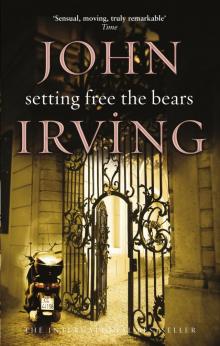 Setting Free the Bears
Setting Free the Bears The Fourth Hand
The Fourth Hand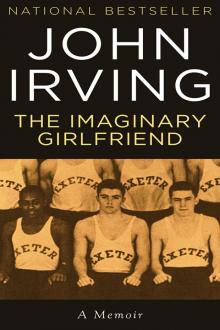 The Imaginary Girlfriend
The Imaginary Girlfriend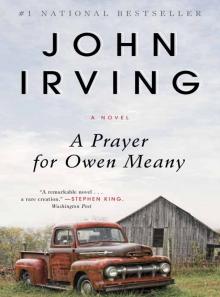 A Prayer for Owen Meany
A Prayer for Owen Meany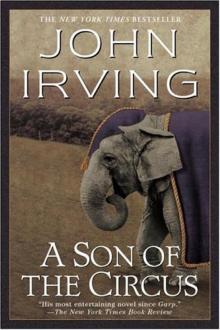 A Son of the Circus
A Son of the Circus Last Night in Twisted River
Last Night in Twisted River The World According to Garp
The World According to Garp The Cider House Rules
The Cider House Rules The Hotel New Hampshire
The Hotel New Hampshire The 158-Pound Marriage
The 158-Pound Marriage Until I Find You
Until I Find You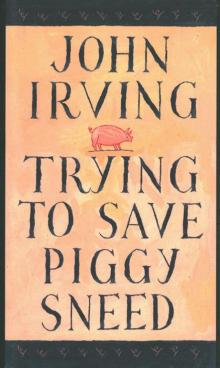 Trying to Save Piggy Sneed
Trying to Save Piggy Sneed Cider House Rules
Cider House Rules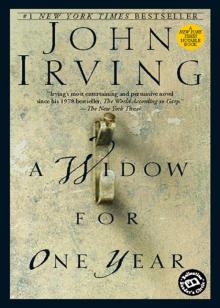 A Widow for One Year
A Widow for One Year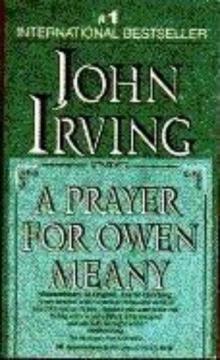 A prayer for Owen Meany: a novel
A prayer for Owen Meany: a novel (2005) Until I Find You
(2005) Until I Find You